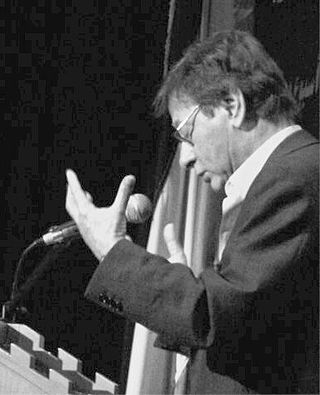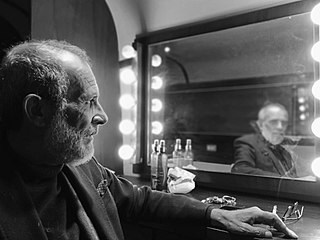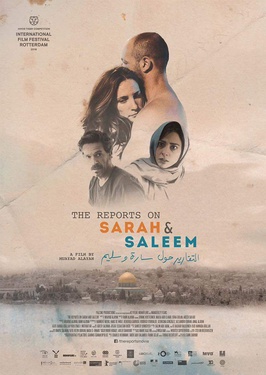
Mahmoud Darwish was a Palestinian poet and author who was regarded as Palestine's national poet.

Huwaida Arraf is a Palestinian American activist and lawyer who co-founded the International Solidarity Movement (ISM), a Palestinian-led organization using non-violent protests and international pressure to support Palestinians.

Kafr Bir'im, also Kefr Berem, was a former village in Mandatory Palestine, located in modern-day northern Israel, 4 kilometers (2.5 mi) south of the Lebanese border and 11.5 kilometers (7.1 mi) northwest of Safed. The village was situated 750 meters (2,460 ft) above sea level. "The village stood on a rocky hill only a little higher than the surrounding area and faced north and west."

Ghada Karmi is a Palestinian-born academic, physician and author. She has written on Palestinian issues in newspapers and magazines, including The Guardian, The Nation and Journal of Palestine Studies.

Samīħ al-Qāsim al Kaissy was a Palestinian poet with Israeli citizenship whose work is well known throughout the Arab world. He was born in Transjordan and later lived in Mandatory Palestine and Israel. Before the Six-Day War in 1967 he was mainly influenced by Arab nationalism; after the war he joined the Israeli Communist Party.

Rashida Harbi Tlaib is an American lawyer and politician serving as a U.S. representative from Michigan since 2019, representing the state's 12th congressional district since 2023. A member of the Democratic Party, she is the first Palestinian American woman to serve in Congress and one of the first two Muslim women elected to Congress.

Susan Abulhawa is a Palestinian writer and human rights activist and animal rights advocate. She is the author of several books, and the founder of a non-governmental organization, Playgrounds for Palestine. She lives in Pennsylvania. Her first novel, Mornings in Jenin, was translated into 32 languages and sold more than a million copies. The sales and reach of her debut novel made Abulhawa the most widely read Palestinian author of all time. Her second novel, The Blue Between Sky And Water, was sold in 19 languages before its release, and was published in English in 2015. Against the Loveless World, her third novel, was released in August 2020, also to critical acclaim.
In the 1948 Palestine war, more than 700,000 Palestinian Arabs – about half of Mandatory Palestine's predominantly Arab population – were expelled or fled from their homes, at first by Zionist paramilitaries, and after the establishment of Israel, by its military. The expulsion and flight was a central component of the fracturing, dispossession, and displacement of Palestinian society, known as the Nakba. Dozens of massacres targeting Arabs were conducted by Israeli military forces and between 400 and 600 Palestinian villages were destroyed. Village wells were poisoned in a biological warfare programme codenamed Operation Cast Thy Bread and properties were looted to prevent Palestinian refugees from returning. Other sites were subject to Hebraization of Palestinian place names.

Ada Aharoni is an Egyptian-born Israeli poet, writer, lecturer, sociologist and peace researcher. She has published numerous books of peace poetry, historical novels, sociology, history, biography, drama, film-scripts, literary criticism, and children's books. In her work she often focuses on the "Second Exodus", the uprooting of the Jews from Egypt, following the establishment of Israel in 1948, which she personally experienced. Aharoni is the founder and world president of The International Forum for the Literature and Culture of Peace (IFLAC).
Nakba Day is the day of commemoration for the Nakba, also known as the Palestinian Catastrophe, which comprised the destruction of Palestinian society and homeland in 1948, and the permanent displacement of a majority of the Palestinian people. It is generally commemorated on 15 May, the Gregorian calendar date of the Israeli Declaration of Independence in 1948. For Palestinians, it is an annual day of commemoration of the displacement that preceded and followed Israel's establishment.

The 1948 Palestine war was fought in the territory of what had been, at the start of the war, British-ruled Mandatory Palestine. During the war, the British withdrew from Palestine, Zionist forces conquered territory and established the State of Israel, and over 700,000 Palestinians fled or were expelled. It was the first war of the Israeli–Palestinian conflict and the broader Arab–Israeli conflict.

Kamel El Basha or Kamel el-Basha is a Palestinian actor, theatre director, teacher, and translator.
Rasha Salti is a researcher, writer, producer, and curator of art and film. She lives and works between Beirut and Berlin. Salti co-curated many film programs at public institutions, including ArteEast, Lincoln Center and Museum of Modern Art in New York, and collaborated with film festivals as a programmer, such as the Abu Dhabi International Film Festival and Toronto International Film Festival. Since 2017, she is the commissioning editor for La Lucarne at ArteFrance, a program dedicated to Auteur documentaries. Her curatorial projects were exhibited at numerous international public institutions, including Barcelona Museum of Contemporary Art, Haus der Kulturen der Welt in Berlin, Museo de la Solidaridad Salvador Allende in Santiago de Chile, the Sursock Museum in Beirut.
Eleonore Merza is an anthropologist who studies Adygean diaspora communities in Israel and beyond.

The Reports on Sarah and Saleem is a 2018 international co-production drama film directed by Palestinian filmmaker Muayad Alayan.

The Nakba is the ethnic cleansing of Palestinian Arabs through their violent displacement and dispossession of land, property, and belongings, along with the destruction of their society and the suppression of their culture, identity, political rights, and national aspirations. The term is used to describe the events of the 1948 Palestine war in Mandatory Palestine as well as the ongoing persecution and displacement of Palestinians by Israel. As a whole, it covers the fracturing of Palestinian society and the long-running rejection of the right of return for Palestinian refugees and their descendants.

The Sheikh Jarrah controversy, which has been described as a "property/real estate dispute" by the Israeli government and its supporters, and as an "expulsion", "displacement" or "ethnic cleansing" event and a matter of international law by Palestinians and their supporters, is a long-running legal and political dispute between Palestinians and Israelis over the ownership of certain properties and housing units in Sheikh Jarrah, East Jerusalem. The evictions are considered a contributory cause of the 2021 Israel–Palestine crisis.

Farha is a 2021 internationally co-produced historical drama film about a Palestinian girl's coming-of-age experience during the Nakba, the 1948 displacement of Palestinians from their homeland. The film is directed by Darin J. Sallam, who also wrote it based on a true story that she was told as a child about a girl named Radieh. It premiered at the Toronto Film Festival on 14 September 2021 and began streaming on Netflix on 1 December 2022.
"Ongoing Nakba" is a historiographical framework and term that interprets the Palestinian "Nakba" or "catastrophe" as a still emerging and unfolding phenomenon. The phrase emerged in the late 1990s and its first public usage is widely credited to Hanan Ashrawi, who referred to it in a speech at the 2001 World Conference against Racism. The term was later adopted by scholars such as Joseph Massad and Elias Khoury. As an intellectual framework, the "ongoing Nakba" narrative reflects the conceptualisation of the Palestinian experience not as a series of isolated events, but as "a continuous experience of violence and dispossession", or as other have termed it, the "recurring loss" of the Palestinian people.














